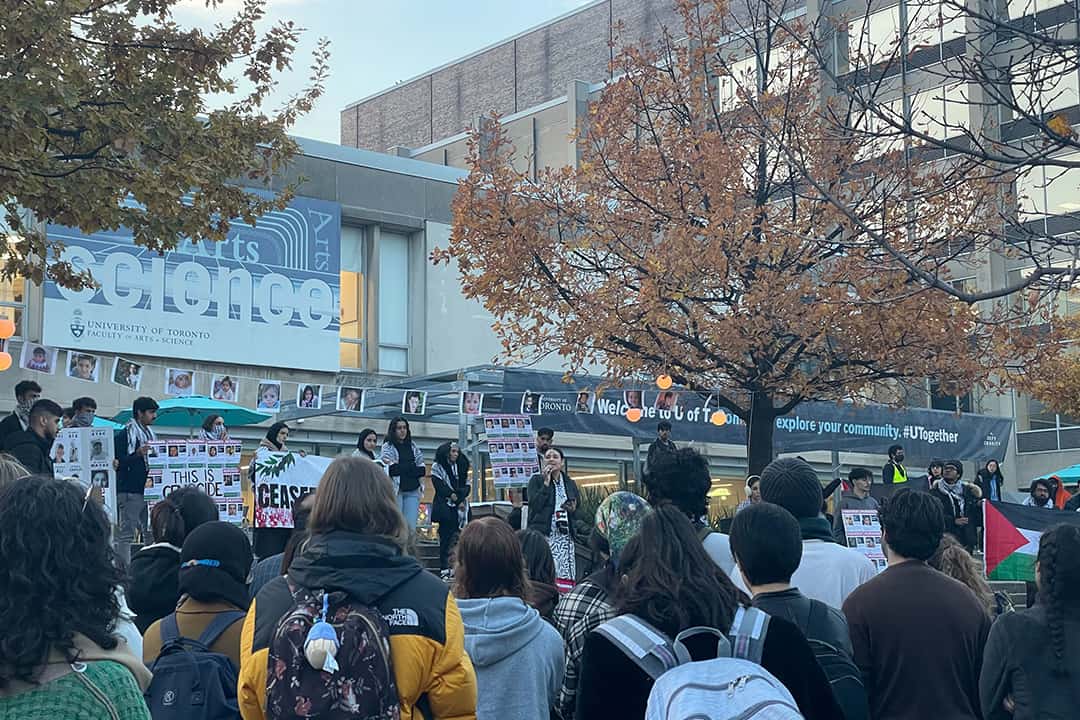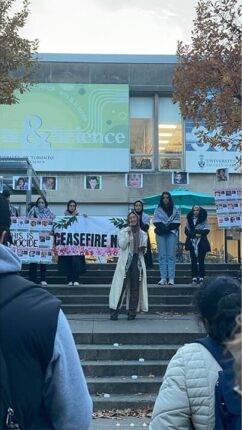Content warning: This article discusses death and recent and ongoing violence in Gaza and Israel.
On November 16, more than 100 people attended a vigil on the steps of Sidney Smith Hall to honour Palestinians killed in violence between the Israeli government and the militant group Hamas, which currently governs Gaza. U of T organization The Palestine Forum (TPF) and the Toronto Metropolitan University (TMU) group the Palestinian Cultural Club organized the event.
As of November 22, the Israeli military has killed at least 14,854 people since it started bombing Gaza on October 7 in response to attacks on Israel by Hamas. An additional 229 have been killed in the West Bank, according to the Palestinian Ministry of Health.
The gathering is one of a flurry of pro-Israel and pro-Palestine advocacy events that groups have organized on U of T’s three campuses since October 7.
Speakers and solidarity
People gathered around 4:00 pm for the vigil. The organizers arranged a tea candle formation spelling “Gaza” and hung photos of over 200 hundred children killed by the Israeli military. Speakers read out the names of Palestinians killed.
Fourth-year TMU business law student Ayah Elmasri told the crowd that they lost 30 family members about a week into the war after the Israeli military bombed their house without warning.
“Since October 7, this month has been the hardest month for my family and I,” they said. “The pain that someone like myself has, who has family in Gaza right now during the ongoing genocide, is a different level of pain.”
Elmasri also spoke about the difficulty that their friends in Gaza have experienced trying to flee to the south after the Israeli government, which has carried out military operations against Hamas in the north, warned Palestinians in Gaza to move southward. More recently, the Israeli government has warned Palestinians to leave cities in the south, indicating that it plans to expand attacks. According to the United Nations, more than 1.6 million Palestinians have been displaced throughout Gaza.
“What we are seeing in Gaza right now is the same thing that happened in 1948, when Palestinians were forcefully forced out of their homes,” Elmasri said, referring to the period after Israel declared independence and during the ensuing Arab-Israeli War. During this period — which many Palestinians refer to as the ‘Nakba,’ which translates from Arabic to ‘catastrophe’ — 750,000 Palestinians fled or were expelled from their homes.
Meir Gorodskoy, a representative from the national activist organization Independent Jewish Voices Canada, spoke against Israel’s displacement of Palestinian residents.
Born in what they called “occupied Palestine” to Jewish parents from the Soviet Union, they told the crowd, “It will take the divestment of the Jewish community, and also the world, to acknowledge that a nation that occupies another nation will never be free.”
In her closing remarks, first-year social justice education master’s student Sara Rasikh encouraged others to continue speaking up for Palestinians.
“The Pro-Palestinian liberation struggle and movement is so obviously the right side of history, but it’s still not easy for people to come out and for them to speak openly about this,” she said.
Other advocacy
TPF held another vigil on October 25 outside of Sidney Smith Hall, and Rasikh said that it decided to host another as the death toll of Palestinians has doubled since then.
In a statement posted on Instagram, which gained over 500 likes as of November 23, TPF called for the U of T administration to disassociate with Israeli businesses and take a stronger stance in support of Palestine.
The post also criticized an October 9 statement released by U of T. “The university’s biased outreach, focusing solely on the pain endured by settlers without mentioning Palestinian anguish, is deplorable,” the organization wrote.
With files from Artie Kronenfeld and Kyla Cassandra Cortez.



